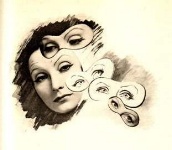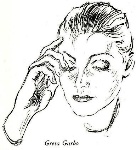She is beautiful as the aurora borealis, but to compare Greta Garbo on and off the screen is to compare Laszlo with Leonardo.
The personality the public sees is magnetic, gay, tragic, sensitive, and wise; but other actresses appear magnetic and sensitive, until the projector stops, and the illusion created by the director and his aides is dispelled.
Only Garbo, when the properties are back in the box, puts on nobility with her mackintosh. In real life she possesses such a wealth of qualities, which the screen is technically incapable of reproducing, that, even if she had not the most beautiful face of our time, yet all other modern beauty would be ephemeral besides her.

Her skin is smooth as marble, generally burnt lightly to an apricot honey colours; her hair is biscuit coloured and of the finest spun silk and clean and sweetly smelling as a baby's after his bath; her mose is so delicate and sensitive that she seems to be conscious of perfumes too subtle for others to enjoy - the perfumes perhaps of her own beauty; her teeth are large and more glistening than pearls; her generous mouth is more delicately controlled than it seems in photographs; as for her eyes, there are never been such before, in expression so quizzical, compassionate and languorous, so deepset and of such unforgettable blue; they have large, dark irises, and boast lashes so long that it is impossible to belive that they are real, for only a few childreen have such a poetic growth. She has the tragic quality of a child.
Lipstick and nail varnish are put to shame by her; she uses no make-up save a dark line like a symbol on her eyelids - a symbol of no period of fashion, original to our civilisation, a symbol only instinct created and yet which the world has copied. She is like a Debureau, pale, forlorn, ethereal, or fecklessly gay.

Her hands, though she calls them kitchenette hands, are long and strong with square-ended fingers; she on hales cigarettes proudly, two fingers held high. Indeed she makes great use of her hands, and, inborn actress as she is, accompanies all her speech with gesture and mime. Tall, she is proportioned to scale, and her feet are long and slender as in Hellenic sculpture; she is agile and supple, even a gymnast.
Her clothes, which are never of the feminine fluffy kind (in fact, she possesses no evening dress) have real elegance. She buys them from the local Army and Navy store, where workmen, sailors, and the like come for overalls and sweat shirts.

And yet all these qualities might be found in beauties who are not Garbo. The magic which intrigues and baffles the imaginative is not trapped and docketed. Her most inveterate worshippers despair of analysing her allure. In a quick turn of the head, in a frank look, in a boyish pout, in that proud glance from lowered lids, so pitying and yet so distant that in others it would be supercilious, in all those expressions of conscious beauty, which when imitated become clumsy, or arrogant, or ridiculous, there is a manifestation of what Hollywood cannot destroy. In the presence of this mystery all that is second-rate can be forgotten.
She despises the level of the films in which she has to appear. The dialogue deadens her and she grumbles at having to portray the symbol of sex.
She would like to play romantic parts, Saint Joan, or Hamlet, or L'Aiglon, and her secret ambition is to be Dorian Gray. She would wish to play with actors who had some spark of originality or inspiration, but the director shows her the receipts for Mata Hari and each ensuing film, and from his point of view there is no reason to alter the policy and so after a half-hearted skirmish she grudgingly submits.
She has a sense of humour, a sense of fun, but she is unhappy, neurasthenic, morbid, for she has become , by accident, in spite of herself, something she never wished to be.

A healthy peasant girl has publicised as an exotic spy. She must lose weight, not even touch carrots - so that not only her health but her nerves have suffered from the worries of publicity. If she is seen hurrying down a side alley, she is chased for a story, and this perpetual hunting so haunts her that, being highly strung, she starts to cry and will lock herself away from even the maid for days on end. She is even too nervous to read.
For these reasons she cannot develop as a person. It is well and good to safeguard herself against the bad influences of Hollywood life, but Garbo has now become unreceptive to anything except herself, so that even when she takes her periodical holidays they are not experiences for her.
She is not interested in anything or anybody in particular, and she has become as difficult as an invalid and as selfish, quite unprepared to put herself out for anyone; she would be a trying companion, continuosly sighing and full of tragic regrets; she is superstitious, suspicious and does not know the meaning of Friendship; she is incapable of love.

She believed in the part of Queen Christina and was roused from her apathy with the result that we saw Garbo, not as a phantom, but as a real and noble character.
During the years that followed we began to wonder why this enigma with her romantic ideas and spiritual thoughts had made no further effort to break the fetters she professed to despise. Then came La Dame aux Camellias. Her performance as Marguerite instilled humour and vitality into a flyblown romance. It was the inevitable formula for another Garbo film, but out of it all, unexpectedly, came this astonishing performance.
Every shade of emotion was present in her characterization; the gaiety of the earlier scenes was not the old aloof gaiety; Garbo had become a loving, suffering, human being. When she was dying, she had the appearance not merely of being ill, but of having lain in bed for months; in her weakness she could not smile, but retained the pride of a Bernini statue.
At moments she seemed to take on herself the wisdom of Lilith, and it was because of these moments that afterwards we wondered whether she had been acting with real understanding or by instinct alone. If she is capable of such creation, she should be appearing on her own account in the roles which she alone can play. But perhaps her magic is only a freak of nature which leads our imagination to make of her an ideal she can never be.
Source |